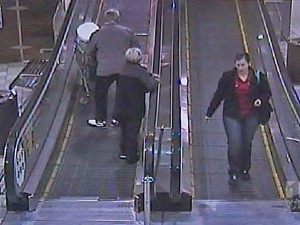
 August 2010, Mrs Polklaser, 76, and her husband Walter were injured when their fully laden shopping trolley rolled backwards while they were using a travelator at the Tea Tree Plaza shopping centre. As a result of her injuries Mrs Polklaser died.
August 2010, Mrs Polklaser, 76, and her husband Walter were injured when their fully laden shopping trolley rolled backwards while they were using a travelator at the Tea Tree Plaza shopping centre. As a result of her injuries Mrs Polklaser died.
Following the incident the security officer gave the trolley involved in the incident to the Woolworths Duty Manager, but did not give details as to the condition of the customer. When the duty manager asked for more information, the response was along the lines of ‘an ambulance was called and the customer was ok, just put the trolley away’.
During the coronial inquiry Regional Manager Michael Batycki gave evidence into the death of Irmgard Polklaser, admitting staff did not follow “normal” practice when told a woman had been injured in an accident involving one of its trolleys.
During his evidence, State Coroner Mark Johns asked him: “Was it sufficient and acceptable in your opinion that he (the duty manager at the time) made no further enquiries beyond being told an ambulance had been called?”
Mr Batycki admitted more could have been done.
“That’s not our normal practice, our normal practice is that if there’s an injury involving anyone, that you take further action,” he said. Mr Batycki said it was company policy for any trolleys involved in hazardous incidents to be isolated and labelled with a danger tag.
“If a trolley had been involved in a serious incident we would take that trolley with details relating to the incident,” he said.
“There would be an investigation… and that trolley that was part of that incident would be very clearly labelled through the use of a danger tag so you could refer back to that if you need to.”
Previously the inquest had heard SafeWork SA were unable to inspect the offending trolley because it had not been isolated from the other trolleys after the incident.
“I’m interested to know what steps Woolworths took to establish the security of this trolley,” Coroner Johns said.
“When did they first become aware of the fact that there was a serious incident involving this trolley? What steps did they take to ensure that their fleet was safe?
This case reiterates the importance of not only establishing a response plan for all incidents, regardless of their nature/consequence, but more importantly reinforces the need for an organisation to follow its own policies, processes and procedures. When demonstrating a duty of care during an inquiry or court proceeding one of the key areas that will be questioned are in regard to the suitability of the organisations process and the ability for the organisation to follow that process.
For consideration, what is Westfields Liability as the manager of the centre? Should this case be brought before the courts could Westfield be held vicariously liable. During the inquiry it was established there were four serious incidents involving trolleys/travelators at Tea Tree Plaza. Did Westfield know of these? and what did they do to prevent further incidents.
MARCH, 2010, a woman with a Woolworths trolley on the same travelator as Mrs Polklaser was knocked over.
AUGUST, 2009, the Woolworths trolley a woman pushed up the travelator near Big W rolled back on to her.
MAY, 2009, a woman was on the travelator with a full Coles trolley. It twisted and, as she tried to straighten the trolley, it hit the side of the moving walkway and she fell back.
MARCH, 2009, a woman with a full Woolworths trolley fell backwards when the brakes did not engage; the trolley swerved ripping the nail off a big toe.
No Responses